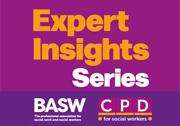
Find a course
04.03.2026 Approaching Complex Trauma in Young People
Wednesday 4th March 2026 - 12.30pm - 4.30pm
Delivered online via Zoom
BASW members - £58.80 inc VAT
Corporate multi bookings - £70.80 inc VAT (contact ProfDE@basw.co.uk to arrange)
Non members - £90.00 inc VAT
Attracting 4hrs CPD
About this event:-
This training session is for social care practitioners working with children and young people to upskill themselves in terms of approaching complex trauma in young people.
Delivered by Harrison Dax Nash, a trainer with over 15 years’ expertise developing a child and youth care charity in South Africa. Dovetailing with this year’s World Social Work Day theme of ‘Co-building Hope & Harmony’, Harrison’s experiences demonstrate the vital role of social work in bringing people together across communities, cultures, and systems to shape a more inclusive and sustainable tomorrow.
Delegates will benefit from knowledge and expertise gained in both UK and International contexts, making this a session not to be missed.
The session will include sections relating to:
- Defining trauma
- Recognising symptoms, behaviours and trauma responses
- Understanding childhood trauma and its impact
- Links between sensory processing and trauma
- Trauma informed approaches – relational practices and strategies
- Communication techniques with young people experiencing complex trauma
Learning Outcomes
- To improve direct practice with children and young people dealing with the impact of trauma
- To empower practitioners with theory into practice guidelines when it comes to approaching complex trauma in young people
- To work towards a best practice approach to trauma in children and young people through equipping practitioners with a practical skillset
- To increase the quality of service delivery in relation to children and young people dealing with the impact of complex trauma through enhanced knowledge and practice frameworks
Trainer Biography
Harrison Dax Nash is a Social Worker who set up the Maranatha Care Children charity in 2009 to assist with youth development through his ongoing work in the Eastern Cape of South Africa.
He then took up a role there as Programme Manager and Social Work Supervisor at Maranatha-Siyakatala Child & Youth Care Centre where as part of the management team he helped to ensure the children and young adults in residential care received the services and support they need full-time for 13 years.
As of 2025 he has returned to the UK and is now a Registered Manager at Plymouth City Council for their new Children’s Home offering.
Harrison received a British Citizen Award (BCA) in 2016 and was then named in the Queens Honours 2020 with a British Empire Medal (BEM), which he was presented in 2022 by the British High Commissioner in South Africa. He is an experienced training facilitator and an honorary Social Work lecturer at the University of Plymouth and in 2025 also won their inaugural Lifetime Achievement Alumni Award.
To be delivered via MS Teams.
21.04.26 Understanding Hoarding Behaviour
Tuesday 21st April 2026 9.30am - 12.30pm
Delivered online via Zoom
BASW Members - £58.80 inc VAT
Corporate multi bookings - £70.80 inc VAT (contact ProfDE@basw.co.uk to arrange)
Non members - £90.00 inc VAT
Attracting 3hrs CPD
About this event
This session will start with a brief overview of the formal diagnosis of hoarding disorder, recognising hoarding behaviours and the effects on daily living. There will be discussions around cases that have been published from the court of protection and coroners court. We will also cover Practical support pathways – including effective approaches and methods of decluttering with case studies to consider, and opportunities for discussion and questions. This training will help with risk assessments, funding applications, involving other professionals, hosting an effective multiagency meeting and using supervision effectively.
Learning Outcomes :-
- A deeper understanding of hoarding behaviour and ways to support people
- Confidence to approach complex situations with practical methods and systems
- Tools to assess and support people who experience hoarding behaviour
- Increased confidence in ‘best practice’ and ways to avoid doing more harm than good
- Discuss learning from case studies
- Access to other available sources of information and resources to continue learning
Trainer bio:
Lisa Barrett is an independent Social Worker with over 20 years of experience across a range of services. She has specialised in working with people with hoarding behaviour for the last 9 years through her Ltd company Clutter Free Living. Lisa is also an Independent Best Interests Assessor, and provides training to health and social care providers and safeguarding partnerships, bereavement support services and decluttering organisations and regularly speaks at social interest groups. She works alongside her clients in their own homes, supporting them with both the emotional and practical aspects of addressing their hoarding and saving behaviours and making their homes safe and accessible.
